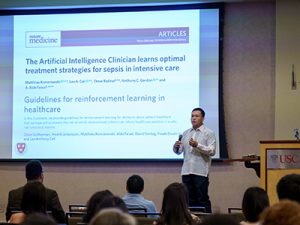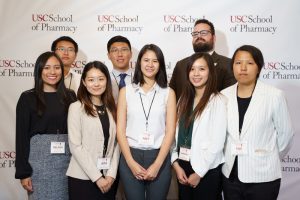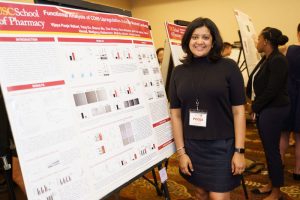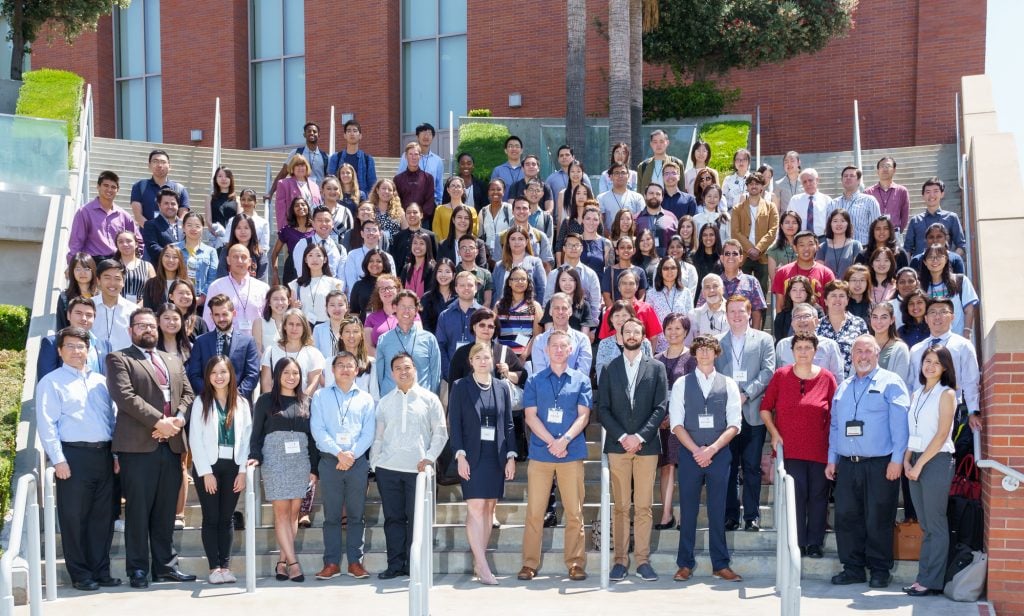How is big data revolutionizing medicine, from bench to bedside?
The 18th annual Moving Targets symposium on Friday, Aug. 23 aimed to answer this question, bringing together USC students with some of the world’s foremost authorities for a day of interdisciplinary dialogue. The USC student chapter of the American Association of Pharmaceutical Scientists (AAPS) presents this day-long research symposium each year, giving students a platform to engage with leading scientific experts on a topic selected by the student organizers.

As artificial intelligence rapidly redefines all aspects of drug development, diagnosis and even patient care, what industry-wide shifts need to be made to fully leverage the transformational power and promise of artificial intelligence in drug development, effectively and ethically, while controlling outcomes for disease treatment? What collaborations—and future academic training in data science and healthcare—are needed to prepare the next generation of researchers and clinicians?
Leo Anthony Celi, clinical research director and principle research scientist at the Laboratory of Computational Physiology at the Massachusetts Institute of Technology (MIT), laid the groundwork for a discussion of these issues in his delivery of the morning keynote address. Health care data is a public good and should be treated as such, he said. “This era of guessing all the time is coming to an end,” he said. “Every minute, a medical decision is made that could be more safe, more objective, more precise.”

Timothy Sweeney, co-founder and CEO of Inflammatix, Inc., which uses machine learning and big data to interpret “reading patterns” of the immune system, gave the afternoon keynote, with an overview of Inflammatix’s approach to developing novel diagnostics and clinics tools.
Featured speakers included Adam Renslo, associate director at the Small Molecule Discovery Center at University of California, San Francisco (UCSF); Bin Chen, assistant professor at Michigan State University whose lab works on developing computational methods and tools to discover new or better therapeutic candidates for cancers, particularly leveraging artificial intelligence to connect different components in translational research; Klaus Romero, director of the Center for Quantitative Drug and Disease Modeling at USC; Michael Engles, senior biological research scientist at Allergan; pediatric cardiologist Jennifer Miller, Digital Health Fellow at the Center for Body Computing at USC.

The 2019 AAPS-USC student organizing committee was led by first- and second-year PhD students Amy Tran (Chair), Rita Li (Vice Chair), Samuel Garza (Secretary), Yue Zhang (Treasurer), Melanie Galano and Charlie Chen (co-communications chairs) and Minchang Choi and Christina Lin (co-social chairs).
“Artificial intelligence technology has taken the pharmaceutical and medical industries by storm, and we wanted to showcase that during Moving Targets 2019,” explained AAPS-USC Student Organizing Committee Chair Amy Tran, who began leading the coordinated event planning efforts in November 2018. “We decided to choose AI and Big Data as a theme for this year’s Moving Targets because we found ourselves struggling with understanding our large data sets as students. We thought, what better way to learn than to invite experts from the field to teach us themselves?”
Tran was joined on the organizing committee by Rita Li (Vice Chair), Samuel Garza (Secretary), Yue Zhang (Treasurer), Melanie Galano and Charlie Chen (co-communications chairs) and Minchang Choi and Christina Lin (co-social chairs).
Student attendees had the opportunity to take their research out of the lab and present their projects in a poster competition. Winners of the 2019 Young Investigator Awards were Vijaya Pooja Vaikari (1st place), Xavier Faraj (2nd place) and Joshua Silva (3rd place).
For more information about the 2019 Moving Targets Conference, visit www.movingtargets.la.


